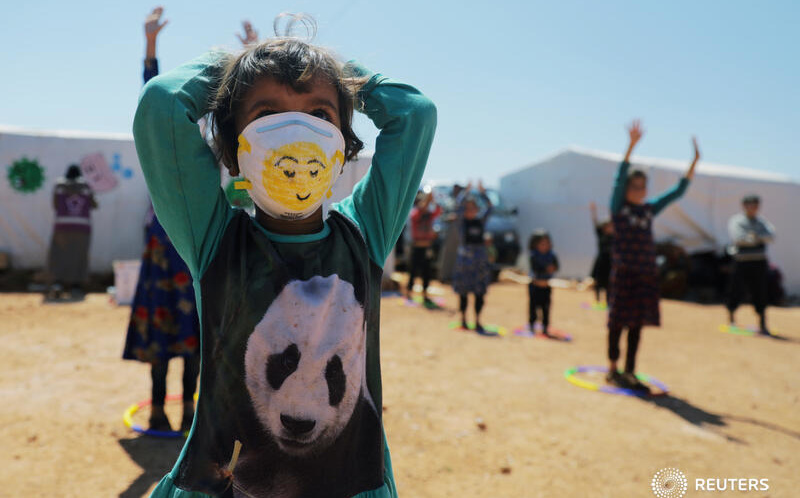A displaced girl at a camp in northern Idlib Province, Syria, April 14, 2020 (Khalil Ashawi/Reuters)
A draft UN resolution is proposing the restoration of cross-border aid into northern Syria, but faces the prospect of a Russian veto on behalf of the Assad regime.
The Security Council resolution, drafted by Belgium and Germany, sustains two crossing points from Turkey into opposition-held northwest Syria, and reopens an Iraqi crossing to Kurdish-controlled territory in the northeast.
In January, Russia and China shut down crossings from Iraq and Jordan with vetoes of a resolution to extend their operations. Moscow also restricted the extension for the Turkish points to six months, and it has rebuffed Ankara’s request for an additional crossing into the Syrian border town of Tal Abyad.
See Syria Daily, May 20: Russia Rejects Reopening of Aid Routes
The Belgian-German resolution draws upon the Coronavirus pandemic to emphasize the necessity for delivery of medical supplies. It renews the mandate for the Turkish crossings, Bab al-Salam and Bab al-Hawa, for a year. The Al Yarubiyah crossing from Iraq will be opened until January 10, and for an additional six-month period if the Council determines assistance is still needed after evaluating a report by UN Secretary-General António Guterres.
Both the Kurdish and opposition areas faces critical shortages amid the pandemic. There is only one machine in opposition-held Idlib to test for Coronavirus and no lab to process results. With more than half of Idlib’s medical facilities damaged or destroyed by about 70 Russian-regime bombings in the past year, only 153 ventilators and less than 200 beds in intensive care are available.
The text emphasizes “a profound challenge to Syria´s health system, socioeconomic and humanitarian situations” which “heightens the imperative of using every possible means of reaching people in need”.
See Syria Daily, April 15: The Only Coronavirus Testing Machine in Opposition-Held Northwest
Russia: “Do Not Waste Your Time” on Aid
The Assad regime, seeking to regain its hold on “every inch” of Syria, objects to any humanitarian assistance to the northern areas.
Last month UN aid chief Mark Lowcock said the cross-border operations are “a lifeline for millions of civilians whom the UN cannot reach by other means”.
But Russian Ambassador Vassily Nebenzia shut down the official, “Do not waste your time on efforts to reopen the closed cross-border points.”
Human Rights Watch assessed in late April that medical supplies and personnel were being blocked to at least 2 million people in northeast Syria.
Under international law, Syria has an obligation to realize the entire population’s right to health. Although limited resources and capacity may mean that these rights can only be fully realized over time, the authorities are still obliged not to discriminate between different parts of the population, and they must justify any aid delivery limitations.

